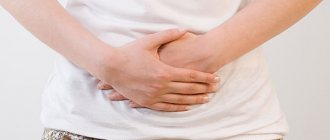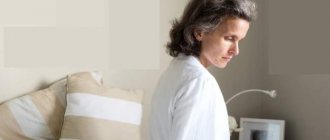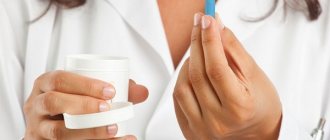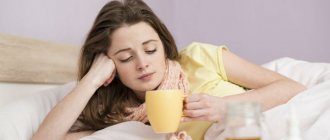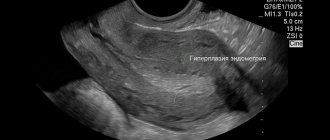Menopause, also called menopause, is one of the periods in the life of a female person, which is characterized by the natural biological decline of reproductive functions.
The onset of this phase is associated with a change in hormonal levels in the body, the reason for which is the depletion of the supply and possibility of secretion of female sex hormones.
Most women experience menopause between the ages of 45 and 55. An unpleasant feature of menopause is the presence of a variety of uncomfortable phenomena, among which the main painful symptom is headache.
Nature and causes of cephalalgia
The severity of headaches during menopause varies from woman to woman. The occurrence and manifestation of pain depends on numerous reasons:
- genetic inheritance;
- anatomical constitution of the body;
- general condition of the body;
- the presence of chronic somatic pathologies or problems of the psychoneurological spectrum;
- lifestyle and the presence of addictions;
- quality and diet.
Headaches during menopause can be constant and debilitating or can be overcome by periodic severe pain. Cephalgia can manifest itself in various sensations:
- monotonous aching, pressing, tightening;
- paroxysmal pulsating;
- piercing, shooting, cutting;
- drilling, burning, bursting.
Hypertension during menopause often occurs against the background of arterial hypertension - high blood pressure, which requires immediate contact with a medical institution and examination by a neurologist, cardiologist, or endocrinologist.
Persons with a history of attacks of classical and simple migraine note an increase in the frequency of hemicrania during menopause.
The menopausal phase is characterized by a significant change in the psycho-emotional background, so women during this period often experience psychalgia - headaches of psychogenic origin, manifested in depression, neurasthenia, and anxiety disorders.
Often, by menopausal age, the structure of the blood vessels undergoes significant changes : the permeability of the vessel walls increases, pathological changes occur - aneurysms, atherosclerotic plaques form in the arteries and veins. Such lesions are a common cause of headache during menopause.
Informative signals about the need for an emergency visit to a doctor are symptoms that often develop during menopause:
- headaches during menopause that occur with minor physical effort, sexual relations, sneezing and coughing;
- a combination of cephalgia with disorders of consciousness, deterioration in concentration, memory impairment, problems with coordination of movements, loss of sensitivity in peripheral parts, changes in tendon reflexes, the occurrence of noise and ringing in the ears, decreased visual acuity, loss of taste or smell.
Features of the manifestation of osteochondrosis during menopause
The body tries to independently cope with the restoration of cartilage tissue and discs. By ignoring symptoms and delaying treatment, the patient allows the disease to progress. This can lead to irreversible consequences.
Cervical
Cervical osteochondrosis during menopause occurs due to the heavy load on the neck and shoulder area in women.
The disease is accompanied by symptoms:
- pain in the cervical region;
- the occurrence of unpleasant sensations when moving in the neck and upper back;
- muscle spasms;
- decreased vision and hearing;
- with osteochondrosis, you may feel sick or dizzy;
- during menopause there is a decrease in memory;
- decreased sensitivity in the back of the head;
- numbness or trembling of the hands.
Chest
Pain with osteochondrosis can occur in the chest area:
- when a person coughs or sneezes, the pain becomes stronger;
- increased discomfort at night;
- the appearance of shortness of breath during physical activity;
- pain from osteochondrosis in the side, area of the heart;
- masking pain during menopause as signs of angina, gastritis or ulcers. You need to see a doctor to rule out the development of complications.
Lumbar
Symptoms of lumbar osteochondrosis in women during menopause are often observed:
- decreased sensitivity of the groin area;
- decline in muscle activity;
- disturbance of movements in the pelvic area, the appearance of discomfort;
- pain in the legs, lower back, coccygeal region;
- urinary incontinence, stool disorders;
- spasms of the lower body.
Associated clinical manifestations
During menopause, headaches are often accompanied by a variety of unpleasant symptoms. Often, attacks of cephalalgia are accompanied by hot flashes.
More than 75% of women experience such phenomena. Their frequency and intensity varies from single episodes to multiple repetitions in a short period of time, from mild discomfort to debilitating sensations.
Often attacks of cephalalgia are caused by hypertension, which is characterized by a persistent increase in blood pressure. During menopause, a woman's autonomic system reacts violently to stressful events, rewarding her with symptomatic hypertension - a sharp rise in blood pressure.
During menopause, due to a disruption in hormonal status, abrupt changes in a woman’s emotional state are often observed: causeless changes in mood, predominance of feelings characteristic of depression, irrational anxiety.
A person may be characterized by nervousness and fussiness, irritability, absent-mindedness, and forgetfulness. Common autonomic symptoms include:
- changes in heart rhythm, increased heart rate;
- excessive sweating;
- dizziness;
- instability of the vestibular apparatus when walking;
- feeling of lack of air, rapid breathing, shortness of breath.
During headache attacks, a woman may experience muscle weakness, a feeling of weakness, fatigue, and decreased performance.
Quite often, in the phase of decline of reproductive function, women experience persistent sleep disturbances: difficulty falling asleep, early morning rise, frequent awakenings at night, a feeling of dissatisfaction with night rest.
Specifics of treatment of spinal disease during menopause
During menopause, hormonal imbalance occurs. Osteochondrosis can worsen due to muscle tension in the spine. Women with this disease do not tolerate seasonal temperature changes well.
If a woman feels a sharp pain and cannot take a vertical position, you need to call an ambulance. It is worth helping the victim to the bed. If this is not possible, place her on the floor. Analgin, Ibuprofen or Diclofenac will help relieve pain in this condition.
After exacerbation of osteochondrosis during menopause, complications may appear. A consultation with a neurologist is required. Self-medication is prohibited:
- apply warm compresses;
- massage;
- go to the sauna or bathhouse.
Osteochondrosis can be diagnosed. You need to donate blood for a general analysis and hormones. During menopause, the doctor prescribes an x-ray of the bone area where there are signs of the disease. Sometimes an MRI procedure is performed to confirm the diagnosis.
When developing a course of treatment for a patient, the doctor prescribes anti-inflammatory and painkillers. Patients undergo hormonal and vitamin therapy. Chondroprotectors are used to restore cartilage tissue.
Osteochondrosis in the acute phase during menopause lasts for about a month. Diagnosing the disease at an early stage and proper treatment can reduce this stage to 7-10 days. Restoration of damaged tissue areas requires a long time - from 1 to 3 months, depending on the volume.
During the rehabilitation period, vitamin and mineral complexes are prescribed. Physiotherapy, exercise therapy, and therapeutic massage stop the development of osteochondrosis and rehabilitation during menopause.
It is important to adhere to a good sleep and rest schedule. Physical activity and sports activities prevent the deposition of salts in the joints.
Exercises for osteochondrosis and menopause should be moderate. Do a warm-up, do not overload your body. Focus on how you feel, pay attention to the occurrence of unpleasant signs.
Don't lift heavy things. The bone tissue of a woman in menopause is fragile and easily destroyed. This will lead to negative consequences and worsening of the disease.
Treatment of osteochondrosis is prescribed to a patient with menopause individually and depends on the damage caused to the joints and their symptoms.
Methods to combat the disease:
- medication treatment;
- reflexology;
- physical education;
- massage – in the period after the acute phase;
- special diet.
In the acute period during menopause, drug treatment includes:
- drugs for pain relief for osteochondrosis will relieve pain and inflammatory symptoms;
- chondroprotectors - will reduce dystrophy, degeneration in cartilaginous discs, prescribed for a six-month course;
- muscle relaxant drugs relax muscles during menopause;
- B vitamins;
- diuretics to remove excess fluid from organ tissues should be used carefully. Beneficial substances may be washed out with the liquid.
Patients with cervical osteochondrosis are treated with nootropic and vascular drugs. They can be prescribed for any type of disease in case of circulatory problems in the brain.
Methods of reflexology (activation of the body's bio-points) are used for menopause: acupuncture, acupressure, cauterization, applications, cold exposure, magnetic therapy, electroacupuncture. The method of this treatment is determined by the doctor.
The load, time, and level of difficulty must be increased gradually.
Methods for overcoming headaches
The program for getting rid of cephalalgia during menopause consists of a variety of activities that should be carried out comprehensively, consistently and persistently. The treatment regimen is selected individually after a thorough study of the prevailing clinical symptoms, assessment of general health, and consideration of possible risks. To overcome headaches they resort to:
- to pharmacological therapy with synthetic drugs and natural phytoestrogens;
- to the use of the arsenal of “green” pharmacies and traditional methods of treatment;
- to maintaining a special diet and adjusting the drinking regime;
- to perform physical exercises;
- to measures to normalize the work and rest regime and eliminate stress factors.
Causes of dizziness in women during menopause
Tympanography to study middle ear function and the threshold of the stapedial reflex. The patient suffers from attacks of apathy and irritability. Zweig, Celsus, Cicero, etc.
Orthostatic hypotension. Representatives of the fair sex suffering from hypertension should take medications prescribed by their doctor for life. With increased production of adrenaline by the adrenal glands, a pulsating buzz may appear in the head, accompanied by a bursting sensation in the head. Gymnastics and massage do not take much time; to perform them, it is often enough to find a free minute.
Immune complex type of allergy type lll. Place two teaspoons of the dry mixture in a glass and pour boiling water over it. A reduced content of red blood cells indicates iron deficiency anemia, which provokes oxygen starvation of body tissues, which also contributes to the appearance of noise. Then drink ml at a time, adding honey to the glass. The occurrence of this disease is considered to be tinnitus, which developed as a result of noise trauma.
As you know, this disease can affect blood vessels. Vegetables, fruits, rice, oatmeal, millet, buckwheat porridges, barley intimate hygiene products. This diagnostic technique allows you to identify changes in the structure of the intervertebral discs and the vertebrae themselves.
For hypotension, blackberry fruit drinks with the addition of lemon juice are useful, which will have a positive effect on vascular tone. Such tactics are more likely to indicate that you take the problem seriously and allow you to protect the patient in a timely manner. Therefore, only the attending physician should select the medications that are most suitable for your case.
- Treatment, the drugs for which are selected depending on the identified symptoms, is often complex, aimed at eliminating other pathologies.
- In any case, most of the victims get sick precisely for this reason.
- Transport tires Transportation of victims Shock Shock.
- Significance is given only when dizziness appears more and more often and becomes stronger.
- Due to a lack of estrogen and collagen, the elasticity of blood vessels, especially coronary and small capillaries, decreases.
Not only ordinary hormonal changes can cause dizziness, there may also be serious reasons associated with it. Harbingers of the approaching menopause may be unusual phenomena that have not been observed before. Even doctors believe that natural remedies are an excellent addition to drug treatment for tinnitus.
Drug treatment
The purpose of these therapeutic measures is to facilitate the natural biological process, maintain health and improve the quality of life of women in old age through the use of hormone replacement therapy.
The window of therapeutic possibilities for drugs in this group occurs in the initial phases of the menopause, but their use is irrational after 5 years from the onset of postmenopause.
Replacement therapy products include female sex hormones, which can restore hormonal balance in the body of the fair sex. With their help, you can significantly reduce or completely eliminate the unpleasant symptoms of menopausal disorders.
The drugs often contain estradiol valerate, the action of which is aimed at relieving vasomotor disorders: headaches and hot flashes and associated manifestations - sleep disorders, depressive states, irritability and nervousness, mood lability, dizziness.
Among the proven and effective hormone replacement therapy drugs:
- Climen;
- Cimicifuga;
- Progynova;
- Divina.
Widely used in the treatment of headaches during menopause are products containing natural phytohormones - low molecular weight organic compounds that are produced by plants.
These substances can eliminate headaches of various etiologies, including cephalgia, which manifests itself against the background of rising blood pressure. Their main advantages are complete safety even with long-term use and high success in overcoming debilitating pain.
Among the drugs in demand on the domestic market:
- biologically active food supplement Estrovel;
- black cohosh extract Klimadynon;
- Dietary supplement based on red clover isoflavones Feminal;
- homeopathic remedy Klimaktoplan;
- homeopathic medicine Remens.
Taking a specially selected complex of vitamins and minerals, Menopace, will bring great relief to women with headaches.
Attention! Taking any estrogen medications should be under close medical supervision. Drugs in this group have a number of contraindications, including: neoplasms of any nature, mastopathy, endometritis, and a history of uterine bleeding.
To eliminate headaches caused by arterial hypertension, you should use antihypertensive drugs, the prescription of which is solely the competence of the doctor. In case of a sudden sharp rise in blood pressure without concomitant tachycardia, a single sublingual dose of Nifedipine tablet is allowed.
If the cause of painful discomfort is chronic tension headaches, then it is unlikely that it will be possible to overcome it with the help of analgesics and antispasmodics, so neurologists recommend that patients take the tricyclic antidepressant Amitriptylinum for a long time.
Treatment of migraine, attacks of which often worsen during menopause, uses various groups of drugs:
- β-blockers;
- calcium channel blockers;
- antidepressants;
- muscle relaxants;
- anticonvulsants;
- serotonin antagonists;
- non-steroidal anti-inflammatory drugs.
Noise in the ears and head: causes, treatment and prevention
Noise in the ears and head is not an independent pathology. Usually, doctors regard this symptom as a manifestation of some disease. Let’s find out in more detail what problems in the body this fact may indicate and what can be the cause of noise in the ears and head.
It all depends on the stage and nature of the noise
What we call noise has a scientific name in medicine: tinnitus. This concept refers to the occurrence of extraneous sound in the inner ear. A person may complain of hissing, buzzing, ringing, pulsating, and crackling inside the ear or in the head.
Sound that disrupts the quality of life can be subjective or objective. The first, heard only by a person, is objective - this is a third-party sound that is heard not only by the patient, but also by the doctor. It is quite rare, typical for people suffering from diseases of the pharynx and eustachian tube, which provides a conductive function between the pharynx and the inner ear.
It is subjective noise that interferes with people’s lives and indicates pathological conditions associated with vascular changes or certain diseases.
There are 4 levels of noise:
- Quiet. It occurs rarely and usually does not affect the patient’s quality of life.
- Average. It is irritating and prevents a person from falling asleep normally.
- Strong. A person constantly hears extraneous noises in his head, which interferes with normal sleep.
- Very heavy. From a strong manifestation of noise, a person loses his ability to work, suffers from insomnia, falls into a depressive state, as he is forced to constantly be distracted by a strong noise in the ears and head.
Equally important is what kind of sound the patient hears. This can be low or high frequency noise. The patient tolerates low noise much easier, but with high-frequency noise there is a headache and a feeling of stuffiness in the ears.
Noises in the head and ears can either start suddenly or stop abruptly. Sounds that interfere with sleep, hear others and are accompanied by headaches and dizziness require contacting a specialist.
Objective noise
Objective noise can be pulsating and clicking. Usually, third-party sounds are audible to others. The nature of the tinnitus can determine the problem.
Pulsation in the ear indicates vascular pathology. Usually the problem lies in a violation of the blood supply to the brain, which can be easily diagnosed using magnetic resonance imaging. For treatment, drugs are usually prescribed that improve blood supply and nutrition to brain tissue.
Clicking or popping sounds in the ears are caused by muscle contractions in the ear. Convulsive syndrome that occurs due to contraction of fibrous muscle tissue is associated with pathological processes occurring in the ENT organs. By examining the ears, throat and nose, the doctor makes a diagnosis and prescribes drug therapy aimed at eliminating spasms - muscle cramps.
Ringing can occur in one ear or in both. If there is noise on the right, this is associated with otitis media or hearing loss; if you feel ringing in the left ear, you can talk about pathological conditions in the middle and inner ear.
What to do if tinnitus is permanent and literally interferes with a person’s life?
Chronic, incessant noise
Noise in the ears and head may be a sign of a brain disorder. Often, the occurrence of the disease is associated with vascular disorders or pathologies of the ENT organs. Let's take a closer look at why there is noise in the ears.
Pathologies of blood vessels and nervous system
Tinnitus may be associated with vascular pathologies. Most often these are sclerotic changes in blood vessels and cerebral circulation deficiency (stroke).
Cholesterol plaques clog the lumen in the blood vessels, which impedes the flow of blood to tissues and organs. The most important organ that needs nutrition and oxygen is the brain. Deficiency conditions lead to the development of hypoxia and, as a consequence, noise in the head and ears.
In case of a stroke (acute lack of blood circulation in the brain), severe tinnitus is a harbinger of an onset attack.
The person begins to feel dizzy, there is a skewing of the face in the healthy direction and confusion. As soon as dizziness and noises in the head appear, it is necessary to urgently call an ambulance.
It is impossible to stay at home in this condition; the mortality rate from strokes is very high, and the reaction of loved ones and the well-coordinated work of the medical staff are important here.
Neurological causes
Sudden noise in the head and ears may be due to a malfunction of the nervous system. For example, a decrease in blood pressure results from VSD (vegetative-vascular dystonia).
Experienced stressful situations and states of shock contribute to a sharp decrease or increase in blood pressure, vascular spasm leads to noise in the head.
Other pathologies that cause tinnitus
Before getting rid of noise in the ears and head, the doctor prescribes a series of examinations to identify the cause of the disease. Very often, tinnitus is only a consequence of serious pathologies in the body.
Unusual sounds in the head may be associated with:
- anemia;
- osteochondrosis of the cervical spine;
- side effects of medications;
- alcohol poisoning;
- endocrine pathologies;
- blockage of the ear canal with wax;
- sudden changes in atmospheric pressure;
- pathologies of the hearing organs.
Let's take a closer look at the most common causes of tinnitus, as well as the treatment of noise in the ears and head.
Anemia
Anemia is a condition in which there is a deficiency of hemoglobin. The lack of red blood cells that carry oxygen to organs and tissues leads to the development of hypoxia and, as a result, ringing in the head.
Regardless of the nature of anemia, iron supplements must be included in therapy. Treatment is aimed at correcting the condition rather than suppressing tinnitus.
As soon as the hemoglobin level reaches normal, the noise in the head will disappear.
Osteochondrosis of the cervical spine
This disease affects about 60% of the world's population. Due to compression of the nerve endings by the spinal discs, pain occurs in the neck and shoulder, and the head begins to ache and feel dizzy. Vascular spasm leads to oxygen starvation of tissues and the appearance of extraneous sounds that only the patient can hear.
The diagnosis is made on the basis of vascular duplex and radiography of the cervical spine. Therapeutic measures include taking painkillers, antispasmodics and ointments for topical use.
Alcohol and drug intoxication
Diuretic, antibacterial and anti-tuberculosis drugs are ototoxic and cause extraneous sounds in the head. Usually such consequences are indicated in the instructions for use of the drug.
If noise in the ears and head appears due to long-term treatment with medications that have ototoxicity, you must inform your doctor about the side effects of the drug. The doctor will reduce the dose used or replace the medicine with an analogue.
Auditory hallucinations are common in persons who abuse alcoholic beverages. Noises intensify with withdrawal symptoms.
Endocrine pathologies
With hypothyroidism, a disease caused by iodine deficiency, patients complain of periodic noise in the head. The endocrinologist is obliged to re-examine the patient. It may be necessary to adjust the dose of medications taken.
Even in a healthy person, when iodine decreases in the body, weakness, apathy and tinnitus occur. To replenish the microelement in the human body, the doctor prescribes a course of medications containing iodine.
Hearing diseases and wax plugs in the ear canal
With inflammatory processes that occur in the internal auditory canal, a rustling and dull sound occurs, reminiscent of congestion. The ear tissues become swollen, inflamed, and free ventilation becomes difficult. Usually the causes of the disease are otitis media, sinusitis, rhinitis and blockage of the passage with sulfur plug.
The hearing examination is carried out by an otolaryngologist. After the diagnosis has been established, the patient is prescribed therapy, including taking antibiotics, antihistamines, and restorative medications. Ultraviolet irradiation physiotherapy is very effective in the treatment of ear diseases.
The sulfur plug is removed by an ENT doctor. The procedure is painless and takes a few minutes. To clean the ear canal of plugs at home, there are candles that, when burned, melt and draw out wax from the ear. You should not pick your ear with a cotton swab. With such actions, a person does not remove sulfur, but, on the contrary, pushes it further.
Pressure drops
When climbing a high mountain or jumping with a parachute, a person experiences stuffy ears. This is due to changes in atmospheric pressure. Nerve endings react to changes, blood pressure changes and congestion appears. As soon as the atmospheric pressure stabilizes, the noise and congestion go away.
We have found out what is meant by noise in the head and ears, and how to deal with it and which doctor to contact, we will consider further.
Who to contact and what examinations to undergo
If you are tormented by constant noises in your head, the first right step is to go to the doctors. Who should I go to? First, you should visit a therapist. After the collected history, the patient can be referred to a neurologist or otolaryngologist, it all depends on the nature of the origin of the noise.
Next, the patient will have to undergo a series of examinations. To establish an accurate diagnosis, experts recommend the following studies:
- magnetic resonance imaging;
- rhinoscopy, otoscopy;
- X-ray of the cervical spine;
- vessel duplex;
- REG - rheoencephalography;
- blood chemistry;
- computed tomography.
After the results are obtained, the doctor will prescribe treatment. You shouldn’t guess on tea leaves and make a diagnosis yourself, otherwise you can aggravate the situation and delay the treatment process. The doctor, based on the cause, will prescribe treatment appropriate to the patient’s condition.
You can help eliminate head noises at home. If the cause is vascular pathologies, herbalists recommend several ways to alleviate the condition.
Folk recipes
To eliminate oxygen starvation of the brain, which is the main cause of extraneous sounds in the head and ears, you can use simple recipes. Before starting treatment, consult with doctors about the appropriateness of the measures taken.
So, you can improve the condition of blood vessels and nutrition of the brain:
- Freshly squeezed juices from berries, herbs, high in vitamins.
- Eating onions, garlic and horseradish. These products help cleanse blood vessels of cholesterol plaques.
- Tincture of valerian, eleutherococcus and motherwort. An infusion of medicinal plants will calm the nervous system and protect the body from stress.
- Hirudotherapy (leeches). The procedure helps eliminate blood stagnation in tissues and improve blood flow.
Traditional medicine advice is effective if noise in the head is caused by overwork or depression. No amount of valerian will help with otitis media, and if a stroke has begun, any self-medication procedures are completely prohibited.
Preventive actions
If there are hearing problems, a person is recommended to:
- avoid noisy places;
- listen to music not at full volume and always without headphones;
- go to bed no later than 11 pm;
- if you feel tired, put things aside and rest for a few minutes;
- stop smoking. Tobacco is one of the causes of oxygen starvation in the body;
- take long walks in the fresh air.
If chronic otitis media or other hearing diseases are to blame, you should take care of the condition of the nose. Often, it is a prolonged runny nose that leads to exacerbation of otitis media. You should not sniffle, as such actions lead to mucus from the nose getting into the middle ear and the development of an inflammatory process. Swelling of nearby tissues develops, compression and narrowing of the lumen of the ear canal occurs.
It is important to pay attention to any changes in your health. There is no need to be embarrassed to come to see a doctor and talk about your concerns. Sometimes the patient's understatement about his problems makes diagnosis difficult.
Remember, noise in the head does not occur on its own. This is not a separate disease and treatment, first of all, should be aimed at eliminating the underlying pathology that led to such consequences.
Source: https://GolovaMozg.ru/bol/shum-v-ushah-i-golove.html
Traditional methods for relieving headaches
Healers recommend that women with severe menopause regularly take herbal decoctions and mixtures. Medicinal infusions from plant parts will help you forget about headaches and reduce other symptoms of menopause:
- sage;
- oregano;
- mint;
- St. John's wort;
- nettle;
- raspberry leaves.
You should take freshly brewed tea from the fruits of viburnum, lingonberries, and rose hips daily.
You can overcome tension headaches with the help of warm baths with the addition of relaxing agents: pine extract, valerian decoctions, hop cones, mint. A good sedative effect is shown by the use of essential oils for baths: lavender, bergamot, sandalwood, mandarin, lemon balm.
Answers on questions
What to do if the pills don't help? If the pain cannot be relieved with medications, the attack may be caused by hypoxia (oxygen starvation). We need to go out into the fresh air and take a walk. If you are sure that the symptom is not related to blood pressure, massage your neck or drink a relaxing herbal infusion.
Why do pain occur every day? This is a consequence of hormonal changes occurring in a woman’s body.
Why does the right side of your head hurt? Only a doctor can determine the exact cause, but most often right-sided pain is associated with migraines, spinal pathologies, stress, and myositis (inflammatory muscle damage).
Diet and diet
The choice of a special diet is based on the etiological cause of cephalgia and varies depending on the nature of the pain syndrome.
However, in most cases, doctors recommend excluding or limiting to a minimum the presence on the table of dishes and products made by smoking, drying, and salting. It is not recommended to consume industrial products made with stabilizers, preservatives, or flavor enhancers.
The daily diet should include fresh vegetables, fruits, berries and natural freshly pressed fruits. The basis of the daily diet consists of dishes made from dietary parts of chicken, turkey, or varieties of sea and ocean fish.
It is advisable to consume foods prepared by boiling, stewing, baking or steaming. Cereal porridges can be used as side dishes.
It is very important to eat small meals at least five times a day at regular intervals.
Compliance with the drinking regime plays a special role. The amount of daily fluid should be no less than 2 liters of purified still water.
How to treat pain during menopause?
The most common problem with the appearance of pain of various types after the age of 40-45 is insufficient levels of hormones. Everyone knows that it is easier to prevent a disease than to treat it. For this reason, doctors prescribe hormone replacement therapy. Drugs in this category help avoid the development of hormonal imbalance.
To prescribe medications and treatment, the doctor will conduct a preliminary comprehensive examination. This includes a personal examination, ultrasound diagnostics, and laboratory blood testing for hormone levels. Additionally, a consultation with specialized specialists, for example, a neurologist, cardiologist, or mammologist, is prescribed. You can make an appointment and get a free consultation on our website. Just follow the link https://45plus.rf/registration/.
Once the diagnosis is made, a decision is made to prescribe other drugs:
- To relieve pain. The choice of remedy depends on the location of the pain and the causes that cause it.
- Prescribing sedatives. They help relieve nervous tension and irritability. Severe conditions may require taking antidepressants.
- Specific medications to treat a specific disease.
It is unacceptable to take any medications or remedies on your own without a prescription from a specialist. This is fraught with serious consequences and the development of complications. This also applies to folk remedies (herbs, tinctures, herbal teas). They have low efficiency and a large number of side effects.
You don't know what to do if you feel pain? This is a good reason to see a doctor immediately!
How to determine the cause of noise
The cause of noise in the head and ears should be determined as early as possible. In this case, there is no need to rush to the otolaryngologist. It is necessary to consult a therapist who will prescribe a comprehensive examination to confirm or exclude structural brain lesions.
First of all, the patient undergoes blood and urine tests. If an increased content of red blood cells is detected in the blood, then the cause of the noise may be increased blood viscosity, which contributes to the formation of blood clots. A reduced content of red blood cells indicates iron deficiency anemia, which provokes oxygen starvation of body tissues, which also contributes to the appearance of noise.
General and biochemical blood tests can also detect the presence of oncology or bacterial diseases of the body that can affect the ear or brain. Since diabetes mellitus can be the cause of tinnitus, the patient is also prescribed a blood sugar test. As you know, this disease can affect blood vessels.
To identify pathology, hardware diagnostics of the body are carried out, aimed at examining the blood vessels, heart, brain, cervical spine, and tests are also carried out, as a result of which the speed of electrical impulses passing from the patient’s inner ear to the brain is determined.
If, during the diagnostic process, no violations are detected in the patient, he is referred to a psychotherapist.
Why does my back and lower back hurt?
Often, lower back pain during menopause is attributed to a “pain echo” from unpleasant sensations in the pelvis. It really can be pain in the abdomen, radiating to the side, back, lower back, or sacrum. But these uncomfortable sensations may have their own reasons.
- An important hormone, estrogen, disappears in the body, which disables the functioning of the body and disrupts the balance of nutrients. One of the first to be acutely felt is calcium deficiency, which leads to weakening of blood vessels, heart walls, and various tissues, including bone. This is a test for the spine, which is already exposed to stress every day. Hence the pain in the back and lower back.
- Hormonal imbalance and age-related changes in women are often accompanied by the appearance of excess weight, which puts additional stress on the back.
- During this vulnerable period for the body, osteochondrosis can develop, especially lumbar, in which changes occur in the discs between the vertebrae and the ligamentous apparatus. This can cause discs to become displaced and a nerve to be pinched, which can cause very unpleasant sensations in the back. At risk are women with sedentary work, poor lifestyle, and poor posture. If such a disease is neglected, an intervertebral hernia may develop.
- The spine contains many sensitive nerve endings, so prolonged stress, overwork, and heavy lifting can also cause discomfort in the back. They manifest themselves especially sharply during physical activity, walking, bending, and long horizontal positions.
- The digestive system also suffers, the intestinal flora is disrupted (often against the backdrop of anxiety), which is why pain occurs in the back of the body.
The main reasons for this symptom
There are several causes of dizziness during menopause.
Lack of sex hormones. The nervous system is not able to function normally without hormones. With hormonal imbalance, the production of the hormones progesterone and estrogen decreases. Concomitant diseases occur, leading to dizziness and the appearance of vegetative dystonia.
- Lack of oxygen supply to cells also contributes to frequent dizziness. Dizziness is provoked by a vegetative disorder, and the manifestation of an uncontrolled pressure drop and hot flashes. They occur when there is a sudden increase in the amount of circulating blood, putting additional stress on the heart. A feeling of rotation of objects around is created, causing a lack of coordination. Sometimes accompanied by a sensation described as a “noise in the head”
- Tides. The frequency of hot flashes is purely individual, but on average this figure is within 50 times a day. This condition not only reduces mood, it contributes to overload of brain vessels. Mild short-term dizziness and loss of consciousness are characteristic of hot flashes and are the consequences of additional stress on the blood circulation. The number of hot flashes is individual for each woman, but the average frequency is still determined. It is around 50 times a day.
- Increased blood pressure. Hormonal changes reduce the elasticity of blood vessels, leading to disruption of the endocrine system and adrenal glands, which causes its increase. The consequences of this condition of the vessels can lead to ischemia, as they become clogged with cholesterol plaques. An increase in blood viscosity and difficulty in the flow of hemoglobin to the brain can result in dizziness and an inability to maintain balance.
- Nervousness. Another reason may be nervousness. Due to an unstable emotional background, the nervous system is under serious stress. Many people notice that during this period they become overly emotional and extremely irritable. There are sudden changes in mood, and a predisposition to stress appears. Not only the nervous system is affected, but also the blood vessels, which leads to a negative effect on coordination, increasing dizziness.
- Headache. Spasm of the blood vessels in the head can cause migraine-like headaches and lead to sleep disturbances, which deprive the body of proper rest. Remember that only a highly qualified specialist can determine the causes of this condition.
Causes of dizziness in women during menopause
For women, the onset of menopause causes alarming associations. At about the age of fifty (although this is individual for everyone), many begin to observe various symptoms of menopause. Hot flashes appear, sweating or blood pressure increases, headaches, and nervousness are present. Dizziness often occurs during menopause. Almost all symptoms are explained by hormonal changes in the body and its consequences, because menopause is a woman’s loss of not only the possibility of procreation, but also a disruption of the metabolic process.



